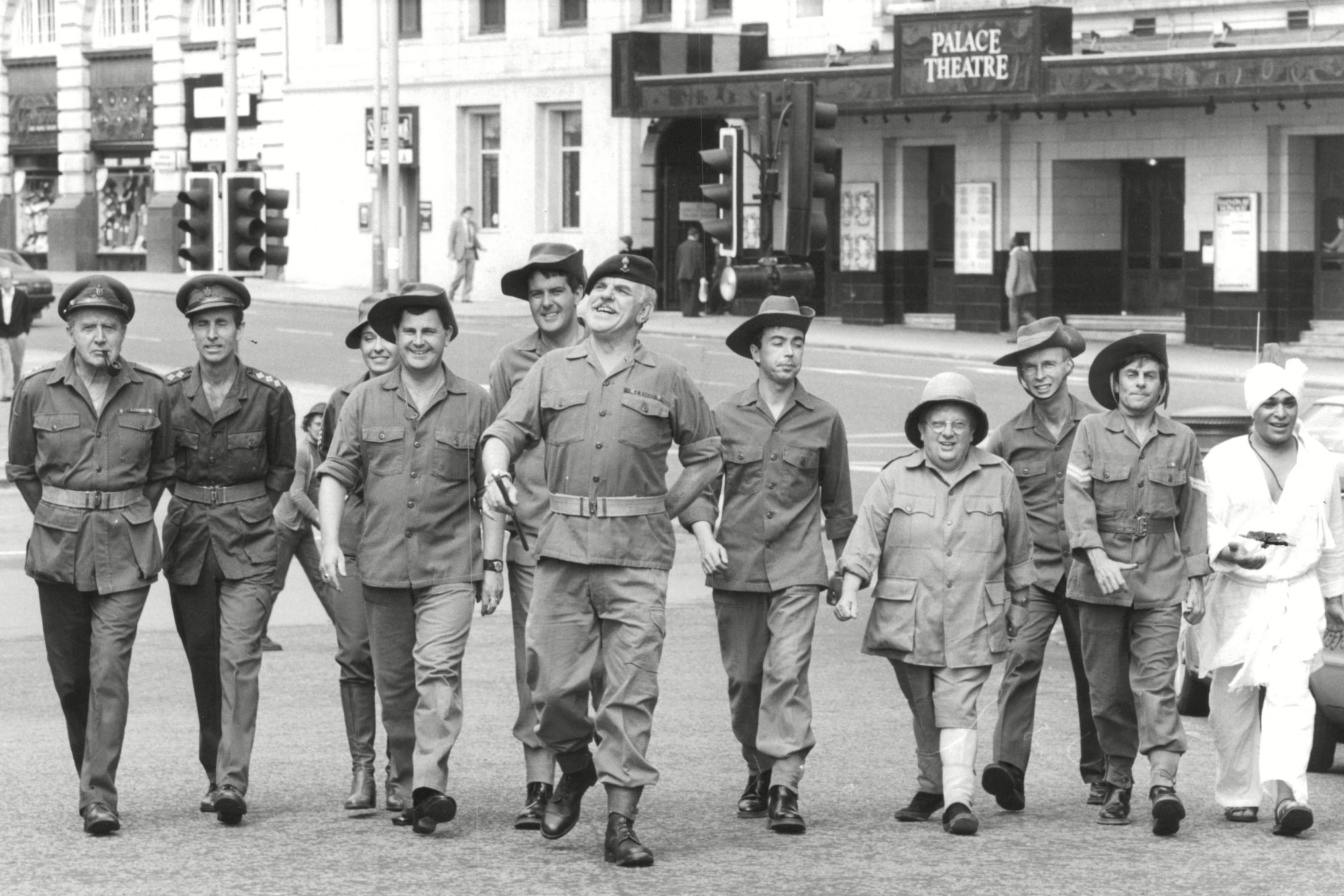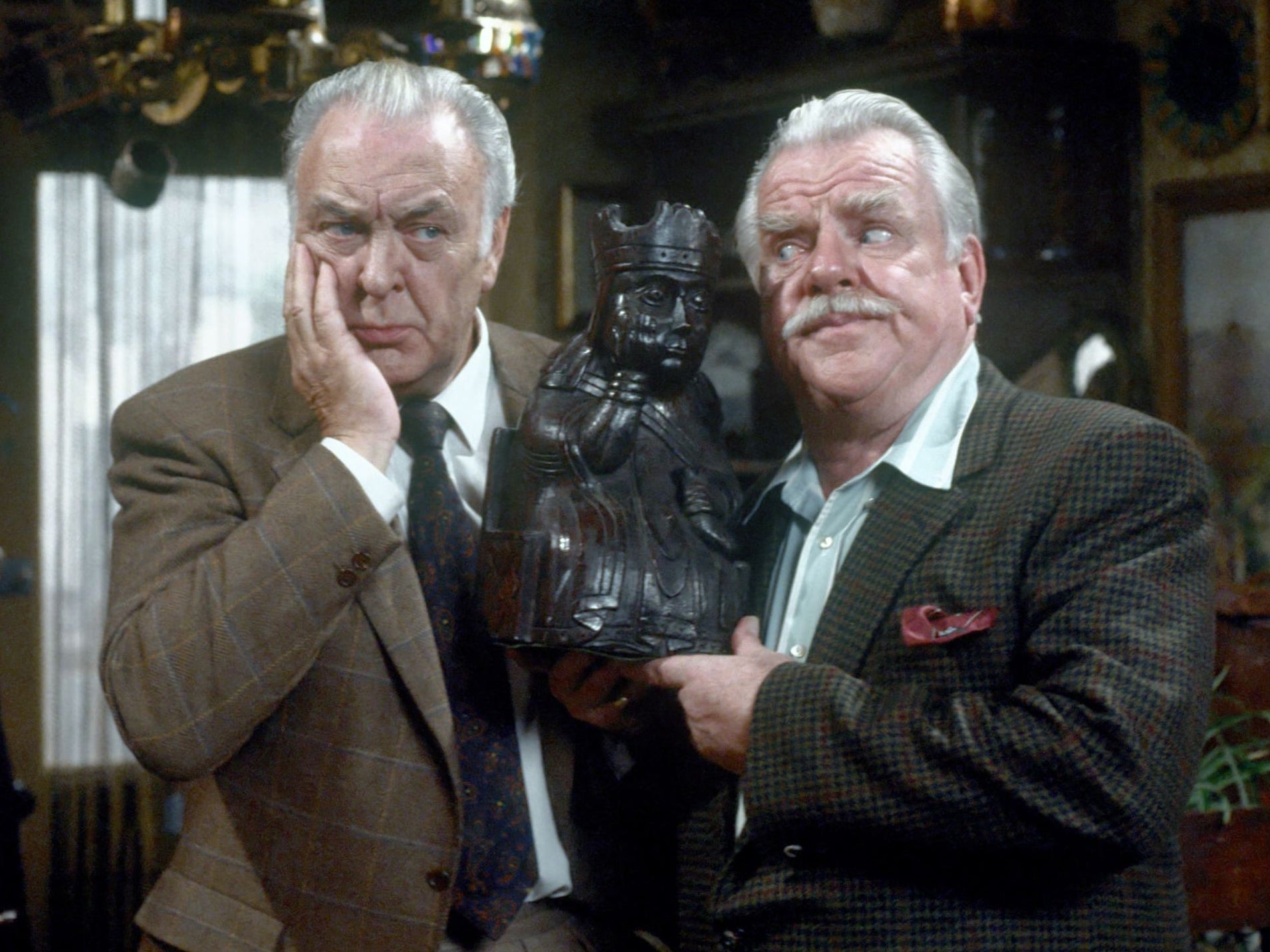Windsor Davies: Star of ‘It Ain’t Half Hot Mum’ and ‘Never the Twain’
Sitcom actor was a familiar TV face in the 1970s and 1980s
Your support helps us to tell the story
From reproductive rights to climate change to Big Tech, The Independent is on the ground when the story is developing. Whether it's investigating the financials of Elon Musk's pro-Trump PAC or producing our latest documentary, 'The A Word', which shines a light on the American women fighting for reproductive rights, we know how important it is to parse out the facts from the messaging.
At such a critical moment in US history, we need reporters on the ground. Your donation allows us to keep sending journalists to speak to both sides of the story.
The Independent is trusted by Americans across the entire political spectrum. And unlike many other quality news outlets, we choose not to lock Americans out of our reporting and analysis with paywalls. We believe quality journalism should be available to everyone, paid for by those who can afford it.
Your support makes all the difference.The role of the bawling Battery Sergeant-Major Williams, training a bunch of rag-bag British army concert party performers in India and Burma during the last days of empire, in the 1970s BBC sitcom It Ain’t Half Hot Mum made Windsor Davies a star.
He will be best remembered as the strict disciplinarian trying in vain to impose high standards on his men – whom he sometimes referred to in those very non-PC times as a “bunch of poofs” – with the frustration of someone who wondered why he had been assigned to the task. “Shut up!” was the moustachioed, Welsh officer’s last resort and became his short but to-the-point catchphrase. However, he showed a more human side when he referred to Gunner Parkins (Christopher Mitchell) as “lovely boy”, suspecting him to be his illegitimate son.
The sitcom (1974-81), launched by the writers Jimmy Perry and David Croft while their legendary series Dad’s Army was still being made, became another long-running success, attracting up to 17 million viewers. Although it was accused by some of being both racist and sexist, It Ain’t Half Hot Mum was defended by its creators as a true depiction of the time and lasted 56 episodes.
Like the writers’ previous success, it featured an ensemble cast, but Davies was firmly at its head by virtue of his commanding-officer role over a royal artillery concert party entertaining British troops during the Second World War.
Some early stories were dominated by the sergeant-major’s attempts to get his men – including the diminutive singer Gunner “Lofty” Sugden (Don Estelle), the drag artist Bombardier “Gloria” Beaumont (Melvyn Hayes) and the egg-headed pianist “Lah-de-Da” Gunner “Paderuski” Graham (John Clegg) – posted “up the jungle” or disbanded altogether.
But he was stuck with them and had to face exploits such as finding himself “anointed” with the dung of a sacred animal – all over his tunic – having a curse put on him after throwing an Indian holy man out of the camp, being arrested for indecent assault on trying to strip “Gloria” to prove that the soldier was a man, and finding himself a potential victim of “friendly fire” when Lofty planned to kill him while consumed by “monsoon madness” on a trip to the northwest frontier.
“The sergeant-major established me over the years like nothing else,” said Davies. “But I wondered afterwards if I would be in work again quickly. In this game, you’re as good as your next job – not the last one. For no special reason, you won’t be asked to act in anything for a long time.”

Davies need not have worried. He followed It Ain’t Half Hot Mum with an even longer-running role in another sitcom, playing Oliver Smallbridge, constantly battling with a rival antiques dealer, Simon Peel (Donald Sinden), in Never the Twain (1981-91). The pair owned adjoining shops, the state-educated Smallbridge, a widower raising a daughter, at the “tatty” end of the market and the former public schoolboy Peel, a divorcée bringing up a son, dealing in “quality” items.
The pair, once business partners, could still not separate their lives once their children announced that they were marrying one another. The comedy came from the verbal insults exchanged and petty victories won by one or the other of the pair, with many of the episodes scripted by Johnnie Mortimer, the programme’s creator, or Vince Powell, two sitcom veterans.
The on-screen chemistry between Davies and the former matinée idol Sinden was another factor in Never the Twain’s success, and it spilled over off screen. In one newspaper interview, the actors discussed their real-life differences. “One of my first teenage memories was seeing Donald in films,” quipped Davies. Sinden retorted: “They said, ‘You’ll be working with Windsor Davies.’ I said, ‘Windsor who?’ They said he wasn’t difficult, but it was a bit of a blow when I heard he was Welsh.”
Indeed, Davies’s background was very different from that of the Devon chemist’s son who had acted with the Royal Shakespeare Company. He was born in Canning Town, east London, in 1930, the son of Welsh parents who returned to their homeland on moving to Nantymoel, in the Ogmore Valley, near Bridgend, when he was 10. After leaving school, he worked in a factory and, for four years, down a local pit, at a time when mining was still the major industry in south Wales. However, following national service, he became a teacher after training in Bangor and took jobs in London, then Staffordshire. “It was a route to escape from the mines,” he said.
But acting was his love and, during six years of teaching, he performed with amateur dramatics companies. “If I was rated as a teacher, it was probably more for my entertainment value than anything else,” he reflected.
Then, at the age of 31, Davies took a three-week drama course at Richmond College of Further Education (1961) and was persuaded by his wife to turn professional as an actor. He recalled: “Lyn said, ‘You’ll never be happy unless you give it a try. Do it now.’ Had it not been for her, I might have decided to keep the security of a teaching job. We had young children and it was a risk.”
He landed a season at Cheltenham Rep, where he met the casting director Miriam Brickman, who introduced him to the director John Dexter when he moved to London. As a result, Davies acted with the groundbreaking company at the Royal Court Theatre, playing the Tramp in Arnold Wesker’s legendary drama The Kitchen and Wallace Morton in Gwyn Thomas’s Welsh family comedy The Keep.
Nevertheless, acting work was often scarce and Davies’s family were sometimes living on the breadline, but four 1962 episodes of the ITV series Probation Officer provided him with his small-screen début and welcome employment.

By the middle of the decade, he was becoming more established, with character roles in programmes such as Redcap (1965, 1966) and the children’s adventure Orlando (1966), before appearing in the Doctor Who story “The Evil of the Daleks” (1967) as Toby, a thug paid to kidnap the Time Lord’s assistant Jamie (Frazer Hines).
Bit-parts became more frequent, usually in dramas – five in both Dixon of Dock Green (1965-72) and Softly Softly (1967-72), and six in Z Cars (1967-74) – but he was also seen in sitcoms, including Nearest and Dearest (as a vicar, 1969), The Worker (1970) and Bless This House (1974).
When fame came with It Ain’t Half Hot Mum, Davies also found himself catapulted to success as half of a singing duo with one of his fellow stars, Don Estelle (Lofty), a decade after they had worked together as a double-act in clubs. “Whispering Grass” (1975), taken from an album recorded by the cast, became a number 1 hit and one of the most memorable novelty singles of all time. “Sing, Lofty!” implored Davies, before Estelle put on his best crooning voice for the slightly satirical version of a 1950 song previously performed by the American doo-wop vocal group The Ink Spots.
The pair recorded several more singles and a Top 10 album, Sing Lofty (1976), as well as appearing in television commercials and a film version of the stage farce Not Now, Comrade (1976). In that, as in many other screen roles, Davies played a policeman, as he had in his first picture, the prison comedy The Pot Carriers (1962).
His other films included Murder Most Foul (1964), Drop Dead Darling (alongside Tony Curtis, 1966), Soft Beds, Hard Battles (starring Peter Sellers, 1974), Carry On Behind (1975) and Carry On England (as a sergeant-major, 1976).
He also starred in the television sitcom The New Statesman (1985), as George Vance, a pompous Welshman and custodian of an agricultural museum near Aylesbury who finds himself elevated to the peerage, and voiced Sergeant Major Zero – one of the leaders of the Zeroids, spherical robots helping to defend Earth from enemy invasion – in the producer Gerry Anderson’s puppet series Terrahawks (1983-6). Later small-screen roles included David Lloyd George in Mosley (1998), General Tufto in Vanity Fair (1998) and Rottcodd in Gormenghast (2000). Jane Davies, the actor’s eldest daughter, is a television casting director.
Windsor Davies, actor, born 28 August 1930, died 17 January 2019

Join our commenting forum
Join thought-provoking conversations, follow other Independent readers and see their replies
Comments